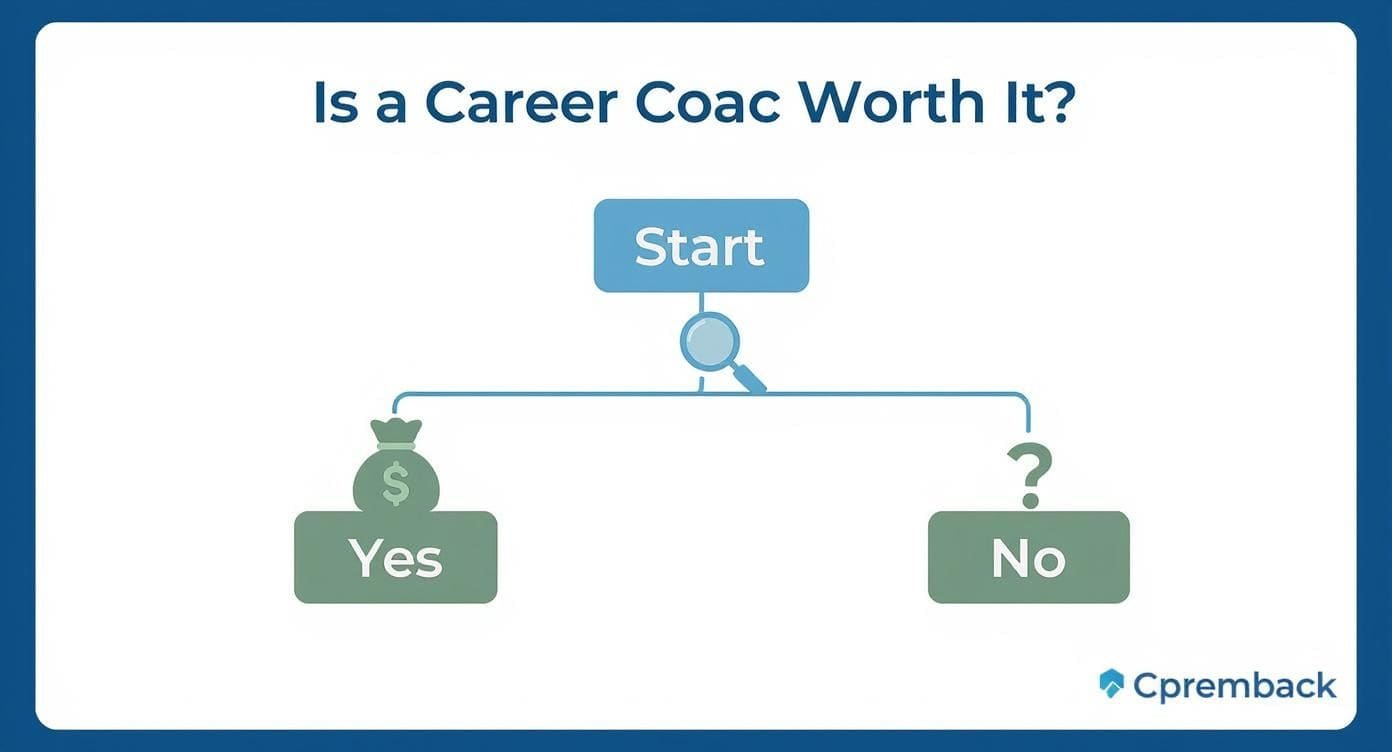Is Hiring a Career Coach Worth It? A Complete Guide
Discover what a career coach does and when you should hire one. This guide covers the signs you need a coach, how to vet them, and the real ROI.

Is Hiring a Career Coach Worth It? A Complete Guide
A career coach is a strategic partner dedicated to helping you map out and achieve your professional goals. Forget generic advice—a good coach gives you a structured framework to pinpoint your strengths, get crystal clear on what you really want, and then build a practical roadmap to get there. They provide the expert strategy, personalized guidance, and—most importantly—the accountability you need to move forward. Think of them as a personal trainer for your career.
What A Career Coach Actually Does For You

Sooner or later, most of us hit a wall. We feel stuck, unfulfilled, or just plain lost about what to do next. A career coach comes in as an objective third party, armed with the tools and perspective to help you break down those roadblocks and build a career that's not just successful, but genuinely meaningful.
They don't have all the answers. Instead, they're experts at asking the right questions to help you find the answers within yourself.
Their goal is to shift you from being a passive passenger to the active driver of your career. This often means diving deep to uncover what truly motivates you, which skills you actually enjoy using, and the kind of work environment where you'll thrive.
Key Services Offered By A Career Coach
A coach's support isn't just a series of pep talks; it's a structured partnership designed to tackle specific challenges. The table below breaks down the core services they offer, showing how they provide practical value at different stages of your professional life.
| Service Area | What It Involves | Who It's For |
|---|---|---|
| Career Clarity & Direction | Deep-dive sessions to align your career with your personal values, strengths, and long-term ambitions. | Professionals feeling stuck, unfulfilled, or considering a significant change. |
| Job Search Strategy | Building a targeted plan to identify the right companies, network effectively, and craft your personal brand. | Anyone actively looking for a new role and wanting to avoid the "spray and pray" approach. |
| Resume & LinkedIn Optimization | Crafting compelling narratives that get past Applicant Tracking Systems (ATS) and grab a hiring manager's attention. | Job seekers whose applications aren't getting responses. |
| Interview Mastery | Mock interviews, feedback sessions, and strategic preparation to build confidence and refine your answers. | Individuals who get interviews but struggle to land offers. |
| Salary Negotiation | Providing market data, role-playing scenarios, and building confidence to ask for what you're worth. | Professionals accepting a new job or seeking a raise in their current role. |
| Leadership Development | Guiding you on how to manage teams, communicate effectively, and position yourself for a promotion. | New managers or those aspiring to move into a leadership position. |
This structured approach ensures you're not just making random moves but are executing a well-thought-out strategy. This kind of specialized guidance is in high demand, with the global coaching industry projected to hit $5.34 billion in 2025—a massive jump from $2.849 billion in 2023.
Beyond The Job Hunt
While many people hire a coach during a job search, their value extends far beyond just landing a new position. They're instrumental partners in your long-term professional growth.
For instance, they can help you:
- Navigate a Career Change: Offering a structured process to transition into a new industry or role, minimizing risks while maximizing your chances of success.
- Develop Leadership Skills: Guiding you on how to manage teams, communicate with impact, and position yourself for that next promotion.
- Master Interviewing: A huge part of a coach's role is providing hands-on interview prep. They offer guidance on everything from pre-call research to post-interview follow-up, helping you understand how to nail the interview for the jobs you really want.
A great coach doesn't just help you find a job; they equip you with the mindset and skills to manage your entire career, turning uncertainty into opportunity and potential into performance.
Ultimately, working with a professional provides the structure, accountability, and expert insight needed to make real, meaningful progress. You can learn more about how a career coach from CV Anywhere can specifically support your journey toward professional fulfillment.
Get your free CV review
Upload your CV and get instant AI suggestions to improve your chances
Recognizing the Signs You Need a Career Coach

It's rarely a single, dramatic event that tells you it's time for professional guidance. More often, the need for a career coach is a slow burn—a persistent feeling that something's off, even if you can't quite name it. Maybe you have a good job with a decent salary but still feel a sense of professional emptiness or like you're just treading water.
If that sounds familiar, you're not alone. Recognizing these subtle (and not-so-subtle) signs is the first step toward building a more fulfilling career. Just admitting you're stuck is a powerful move toward getting unstuck.
Many people wait until they hit a full-blown crisis, like a layoff or burnout, before reaching out. But the best time to partner with a career coach is often the moment you first notice those warning signs of a career plateau.
Your Job Search Is Stalling
One of the most obvious red flags is a job search that has gone cold. You're firing off resumes into the void and hearing nothing back. Or maybe you're landing interviews but never seem to get the offer. It's a frustrating cycle that can quickly chip away at your confidence.
When your strategy just isn't working, a coach can provide the objective, expert perspective you're missing.
Here are a few common job search roadblocks a coach can help you demolish:
- Your Resume Isn't Getting Past a Screen: You have solid experience, but your resume isn't written to beat the Applicant Tracking Systems (ATS) or grab a recruiter's attention in those first crucial six seconds.
- You're Not Interviewing Effectively: You might be struggling to articulate your value, answer behavioral questions with compelling stories, or build genuine rapport with interviewers.
- Your Networking Efforts Are Falling Flat: You're reaching out to your connections but aren't seeing any tangible leads or referrals, which means your approach likely needs a tune-up.
A good coach acts as a troubleshooter, pinpointing the weak links in your job search and giving you the tools to fix them.
You Feel Stuck or Unfulfilled
This is probably the most common reason people seek out a coach: that nagging feeling of being trapped. You might be in a role you've outgrown, in an industry that no longer excites you, or on a career path that doesn't align with your values. You know you're capable of more but feel paralyzed by not knowing what to do next.
A career coach helps you translate vague feelings of dissatisfaction into a clear vision and an actionable plan. They create a structured space for you to explore your options without pressure, turning "I don't know what I want" into "Here's my next step."
This sense of being stuck can also show up as boredom, a lack of motivation, or that all-too-familiar Sunday night dread. These are all signals that your current role isn't providing the growth or purpose you need. Ignoring them is a fast track to burnout.
A Major Transition Is on the Horizon
Even if you aren't unhappy, you might be facing a big professional change that feels too overwhelming to tackle alone. These are high-stakes moments where having an expert in your corner can make all the difference.
This growing reliance on expert guidance is reflected in market trends. The global career coaching market is projected to reach approximately $3.2 billion by 2025, showing a major shift where individuals and companies alike view coaching as a crucial investment. You can read the full analysis of career planning marketing statistics to understand this trend better.
Consider hiring a career coach if you are:
- Considering an Industry or Role Change: You want to pivot but have no idea how to transfer your skills or get your foot in the door of a new field.
- Re-entering the Workforce: After a break for caregiving, travel, or other personal reasons, you feel out of touch with today's job search landscape.
- Aiming for a Big Promotion: You want to move into a leadership position but need to build specific skills or increase your visibility within the company to get there.
In these moments, a coach acts as your strategic guide, helping you navigate the unknown with a clear map and a confident game plan.
How to Find and Vet the Right Career Coach

Choosing the right partner is hands down the most critical step in your coaching journey. The connection you build with your career coach directly shapes your results, so it's vital to find someone who not only brings the right expertise but whose style actually clicks with yours.
Think of it like picking a co-pilot for a long-haul flight. You need a skilled professional you can trust to navigate turbulence and help you land safely at your destination. This isn't about a quick Google search; it's a thoughtful process of finding, evaluating, and selecting someone you can genuinely align with.
The good news is that your options are better than ever. The career coaching industry is booming, with the number of active coaches expected to hit 167,300 worldwide by 2025—a massive jump from 126,050 in 2023. This growth, detailed in this coaching industry growth report, shows a huge global demand for these specialized skills.
Where to Begin Your Search
Finding a qualified career coach starts with looking in the right places. A simple search will throw thousands of names at you, but a targeted approach helps you cut through the noise and find credible candidates much faster.
Focus your search on platforms and organizations known for their professional standards. Here are a few reliable spots to start:
- Professional Networks: LinkedIn is a goldmine for this. Use its search filters to find coaches who specialize in your industry or target role. Look for detailed profiles packed with client recommendations and insightful content.
- Accredited Coaching Bodies: Organizations like the International Coaching Federation (ICF) maintain directories of certified coaches. This is a great way to find professionals who have cleared rigorous training and ethical hurdles.
- Industry-Specific Associations: If you're in a niche field like tech, marketing, or finance, seek out coaches active in your industry's professional associations. They'll have a much deeper grasp of your unique challenges.
The Vetting Process: Questions to Ask
Once you've shortlisted a few potential coaches, it's time to vet them. Most offer a free initial consultation or "chemistry call," and this is your chance to interview them and see if it's the right fit. Don't be shy—ask direct questions to understand their process, their experience, and how they define success.
The point of the consultation isn't just to see if they can help you—it's to feel if you can trust them with your career. Pay close attention to how they listen, the quality of their questions, and whether you feel genuinely understood.
When you're on those initial calls, it helps to have a game plan. The table below is a checklist of essential questions to ask any potential coach. It's designed to help you dig deeper than the surface-level pitch and truly understand if they're the right partner for your goals.
Essential Vetting Questions for Your Potential Coach
Use this checklist during your consultation calls to thoroughly evaluate a career coach and ensure they are the right fit for your goals.
| Question Category | Specific Question to Ask | What to Look For in Their Answer |
|---|---|---|
| Methodology & Process | "What is your coaching philosophy and what does a typical engagement look like?" | A clear, structured process, not a vague "we'll figure it out" approach. They should be able to outline milestones and session structures. |
| Experience & Expertise | "Can you share examples of clients you've helped with similar goals to mine?" | Specific, anonymized success stories that resonate with your situation. Bonus points if they have experience in your industry. |
| Measuring Success | "How do we define and measure success in our work together?" | A collaborative approach to setting measurable goals (e.g., job offer, salary increase) and intangible wins (e.g., confidence, clarity). |
| Credentials & Training | "What are your coaching certifications and what ongoing professional development do you pursue?" | Formal training from a reputable institution (like ICF). This shows a commitment to their craft beyond just personal experience. |
After asking these questions, you should have a much clearer picture of who you're dealing with. A great coach will welcome this level of scrutiny because they're confident in the value they provide.
Red Flags to Watch Out For
Just as important as knowing what to look for is knowing what to avoid. A great career coach is your partner, not a magician. Be wary of anyone who makes over-the-top promises or uses high-pressure sales tactics.
Here are a few red flags to keep on your radar:
- Guaranteed Job Placements: No coach can guarantee you a job. Their role is to give you the tools and strategy to succeed, but the outcome ultimately depends on you and the market.
- One-Size-Fits-All Solutions: Your career path is unique. A good coach tailors their approach to your specific needs instead of pushing a rigid, generic program on everyone.
- Lack of Transparency: They should be completely upfront about their process, pricing, and what you can expect. Vague answers or a reluctance to share details is a major warning sign.
This vetting process ensures you find a true partner in your career journey. For professionals who need to sharpen a specific skill, like acing interviews, a dedicated interview coach can provide highly focused, practical training to help you master that crucial stage of the hiring process.
Understanding Career Coach Costs and ROI
Hiring a career coach is a serious financial decision, and it's smart to ask the big questions: How much does this actually cost, and is it really worth it? The key is to stop thinking of it as a cost and start seeing it as a strategic investment in your future—both in your earning potential and your day-to-day happiness at work. The price tag is real, but the return can be life-changing.
Like any professional service, there's no universal price tag. A coach's fees will vary based on their experience, what they specialize in, and how deep they go with their support.
But you can get a good handle on what to expect by understanding how most coaches structure their pricing. This makes it much easier to compare your options and find something that fits your budget and your goals.
Common Pricing Structures
Most coaches work in one of two ways: they charge by the hour, or they offer comprehensive packages. Each model is built for different needs.
- Hourly Rates: Think of this as a pay-as-you-go option. You can expect rates anywhere from $150 to over $500 per hour, depending on the coach's reputation and area of expertise. This is a great fit if you need targeted, short-term help, like running through a mock interview or getting a final pair of eyes on your resume.
- Package Deals: This is the go-to for bigger goals, like navigating a full career change or managing a months-long job search. Packages usually include a set number of sessions, plus ongoing support like email check-ins and document reviews. These typically range from $1,500 to $5,000+ and provide a much more structured, supportive experience.
While those numbers might feel steep, it's crucial to weigh them against what you stand to gain.
Calculating Your Return on Investment (ROI)
The real value of a career coach isn't measured by the hour; it's measured in results. Your ROI comes from both tangible financial wins and the kind of intangible benefits that can reshape your entire career path.
The goal of coaching isn't just to find any job—it's to land the right job, faster, and with a higher salary than you might have secured on your own. This acceleration is where the financial return becomes clear.
Let's talk about the hard numbers. A major, measurable outcome is almost always a salary increase. Many clients see a significant average salary increase when changing jobs after working with a coach. Just think—a $10,000 salary bump pays for even a high-end coaching package several times over in the first year alone.
Beyond the Paycheck: The Intangible Gains
A bigger salary is fantastic, but the benefits that stick with you long-term are often the intangible ones. This is the stuff that builds a foundation for a successful and satisfying career for years to come.
Don't overlook these powerful returns:
- Renewed Confidence: Finally shaking off that imposter syndrome and learning how to talk about your value with conviction.
- Professional Clarity: Getting a clear, actionable answer to the question, "What do I really want to do?" and getting a map to get there.
- Reduced Job Search Time: Landing a role months faster than you would have on your own, which means months of regained income.
- A Powerful Strategic Network: Learning the right way to build and use professional relationships—a skill that pays off for your entire career.
When you start factoring in these gains, the initial cost starts to look a lot more like a smart investment. For those who want to explore more budget-friendly options first, comparing the pricing of DIY career tools against the personalized guidance of a coach can give you a clear sense of different investment levels.
Ultimately, the right coach doesn't just find you a job; they accelerate your journey and give you skills that will pay dividends for the rest of your career.
Career Coach vs. AI and DIY Career Tools
With the explosion of powerful AI resume builders and endless free career guides online, it's a fair question to ask: is a human career coach even worth it anymore? Tools can scan your CV for keywords in seconds and spit out a cover letter in a flash. The DIY route has never seemed so appealing.
But here's the thing: technology and human guidance aren't competitors. They're two sides of the same coin, each brilliant at different things.
Think of AI tools as hyper-efficient assistants for specific, process-driven tasks. They absolutely crush things like formatting, keyword analysis, and cranking out first drafts, saving you hours of tedious work. But an algorithm can't give you the gut-check advice, the accountability, or the nuanced strategic thinking that a real coaching partnership provides. The smartest approach is a hybrid one—use tech for the grunt work and a human expert for the high-stakes guidance.
This infographic lays out a simple decision tree to help you figure out if a human coach is the right investment for you right now.

As you can see, the choice really boils down to whether you need a tactical tool to get a task done or a strategic partner to help you navigate complex, career-defining decisions.
Where AI and DIY Tools Shine
AI-powered platforms have made huge leaps in automating the most soul-crushing parts of a job search. They act as incredible assistants for executing clear, defined tasks with speed and precision.
You can think of these tools as a production line for your application materials. They take your raw experience and quickly assemble it into a polished, professional format that's ready to go.
Here's where modern career tools are unbeatable:
- Speed and Efficiency: They can generate a tailored resume or cover letter draft in minutes, a task that could otherwise take hours.
- Keyword Optimization: Platforms like CV Anywhere are built to analyze job descriptions, ensuring your documents have the right keywords to sail through Applicant Tracking Systems (ATS).
- Consistency and Formatting: These tools eliminate silly formatting mistakes, guaranteeing your CV looks clean and professional every single time.
These features are a game-changer. In fact, a growing number of professionals are learning how AI resume builders secure job interviews by making sure their applications are perfectly tuned to a role's technical demands.
The Irreplaceable Value of a Human Coach
While technology handles the "what," a human career coach is all about the "why" and the "how." An algorithm can tell you which keywords to add to your resume, but it can't help you figure out if you even want the job you're applying for.
A great coach is your sounding board, your strategist, and your accountability partner, all rolled into one. Their value is in providing the context, empathy, and personalized strategy that software just can't replicate.
A DIY tool gives you a map, but a career coach helps you choose the destination, navigate the unexpected detours, and gives you the confidence to drive. They address the human elements of a career journey that technology simply can't touch.
Here is where a human coach delivers value you can't get from a machine:
- Emotional Intelligence: A coach gets it. They understand the fear, self-doubt, and frustration that come with a job hunt or career pivot. They provide the empathy and encouragement you need to stay resilient.
- Customized Strategy: Your career path isn't a template. A coach helps you connect the dots between your past experiences, current skills, and future goals to build a strategy that is 100% yours.
- Tough-Love Accountability: It's so easy to put off networking or avoid that difficult conversation about a raise. A coach holds you accountable, pushing you to take the important actions you might otherwise let slide.
- Nuanced Industry Insights: An experienced career coach brings years of real-world knowledge about hiring managers, company cultures, and salary benchmarks that an algorithm just can't scrape from the internet.
Ultimately, you don't have to choose one over the other. The best approach is to build a powerful hybrid system. Use AI tools to handle the repetitive, data-heavy tasks with brutal efficiency. Then, partner with a career coach to navigate the complex, high-stakes strategic decisions that will truly shape your professional future.
Your Top Questions About Career Coaching, Answered
Even after getting a sense of what a coach does, you probably still have a few questions floating around. That's completely normal. Making the decision to invest in yourself is a big one, and you want to be sure.
Let's clear up some of the most common questions professionals have before they take the leap.
Career Coach vs. Mentor: What's the Difference?
This is easily the most common point of confusion. While both a coach and a mentor can be incredible assets for your career, they serve very different functions. Knowing which one you need right now is crucial.
A mentor is usually a seasoned pro in your field who offers advice and wisdom based on their own journey. Think of them as a friendly guide who has already navigated the terrain you're on. The relationship is often informal, long-term, and built on sharing experience and opening doors through their network.
A career coach, on the other hand, is a trained expert in process, structure, and accountability.
A coach isn't there to give you the answers from their own playbook. They use proven methodologies and powerful questions to help you find your own solutions. Their expertise is in the process of professional growth, not necessarily in your specific industry.
This structured, goal-oriented approach is what turns a vague idea like "I want a new job" into a concrete, step-by-step action plan.
How Long Does a Coaching Engagement Last?
There's no magic number here. The timeline is completely tailored to the size and complexity of your goals. Any good coach will help you map out a realistic timeframe during your first conversation.
Generally, engagements fall into two camps:
- Short-Term Sprints (2-3 months): This is perfect for hitting a specific, time-sensitive target. Think things like running a focused job search, prepping for a round of high-stakes interviews, or nailing a salary negotiation. The goal is clear, measurable, and has a finish line.
- Long-Term Development (6-12 months): For bigger ambitions like a complete career change, building out your leadership skills, or developing better long-term career management habits, a longer runway is necessary. This gives you the space for deep work, skill-building, and creating lasting change.
Most coaches structure their packages to align with these timelines, so you get consistent support from start to finish.
How Is Success Actually Measured?
Measuring the success of coaching isn't just about the final outcome; it's a process that starts on day one. You and your coach will define what a "win" looks like for you, and you'll track it through both tangible results and the kind of personal growth that sets you up for the long haul.
The tangible metrics are the clear, quantifiable wins. You can point to them on paper.
Some concrete examples of success include:
- Landing a new job in your target industry.
- Securing a meaningful salary increase (e.g., 15% or more).
- Earning that promotion to a leadership role.
- Successfully transitioning into a brand new field.
But honestly, the intangible metrics are often where the real magic happens. These are the internal shifts that pay dividends for years—a huge boost in confidence, a real sense of clarity about your professional path, and just feeling happier and more satisfied at work. A great career coach delivers on both fronts, making it an investment that truly lasts.
--- Ready to stop guessing and start building a clear path forward? The AI-powered tools from CV Anywhere can help you optimize your resume, track your applications, and prepare for interviews with confidence. Get started for free on cvanywhere.com and take control of your career journey today.
Tags
Related Articles
Coach for Interview: Ace Your Next Job Opportunity
Coach for Interview: Ace Your Next Job Opportunity Working with a coach for interview preparation is your secret weapon for walking into a hiring manager's office and truly owning the conversation. Th...
Read more →How to Write a Letter for Resignation Letter
How to Write a Letter for Resignation Letter Writing a professional letter for resignation letter is the final, crucial step in leaving your job. It's more than just a formality; it's the official doc...
Read more →Top Resume Gaps in Employment Examples for Your 2026 US Job Hunt
Explaining employment gaps on a resume can be daunting, but the right approach transforms a potential weakness into a compelling story of growth and intention. The best way to address an employment ga...
Read more →Popular Articles
Finding the right cv template google docs can be a great starting point for your job search, but it's often not the most effective path to getting hired. Whilst templates offer a visual framework, the...
The best way to craft a comprehensive and professional CV of curriculum vitae is with a dedicated tool like CV Anywhere's CV builder. It ensures your document is perfectly formatted and optimised to h...
Stop searching for the perfect template of resume. Trawling through hundreds of options to find one that fits your experience is an outdated, frustrating process. The solution isn't a better template;...
Here is a detailed breakdown of the 12 best options for a resume maker for free available today. We've done the research for you, so you can stop searching and start building a professional, job-winni...
Picking the right resume templates is your first—and most important—move in getting a recruiter's attention. It's not just about looks; a great template is a strategic tool. It organizes your career s...